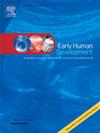Forever premature: Adults born preterm and their life challenges
IF 2
3区 医学
Q2 OBSTETRICS & GYNECOLOGY
引用次数: 0
Abstract
Background
Adults born preterm face greater social, cognitive, mental and physical challenges in adulthood than their full term born peers according to longitudinal studies. In contrast, little is known about the lived experiences of adults born preterm.
Objective
The study investigates the lived experiences of adults born preterm across the life course and their views on health care support.
Methods
A qualitative study of 21 participants completing semi structured interviews analyzed through content analysis.
Results
Over half of adults born preterm report trauma and feeling of otherness since early childhood, high sensitivity to the environment, higher introversion/shyness and social or performance related anxiety. Over half reported that their parents were traumatized by the preterm birth and tried to compensate by overprotective parenting that, however, stifled them becoming independent. Over half experienced bullying victimization and many have continuing mental health problems. Overload by demands in school or work is a consistent theme that makes it hard to have the energy to socialize. Many received physical therapy in childhood and most had psychotherapy in adulthood. Many feel that health professionals trivialize the long-term effects of prematurity and most find support from their parents or peer network.
Conclusions
Prematurity has significantly shaped the life of adults born preterm. Greater awareness and recognition of the unique needs of this group are essential to provide adequate support. Existing services fail to address these needs highlighting an urgent demand for enhanced social and psychological services for educational and workplace settings.
永远早产:早产儿和他们的生活挑战
根据纵向研究,早产的成年人在成年后比足月出生的同龄人面临更大的社会、认知、精神和身体挑战。相比之下,人们对早产儿的生活经历知之甚少。目的了解早产儿成人全生命历程的生活经历及其对卫生保健支持的看法。方法通过内容分析,对21名完成半结构化访谈的参与者进行定性研究。结果超过一半的早产儿自童年早期就有创伤和异类感,对环境高度敏感,内向/害羞以及与社交或表现相关的焦虑。超过一半的人报告说,他们的父母因早产而受到创伤,并试图通过过度保护的父母来弥补,然而,这阻碍了他们变得独立。超过一半的人遭受过欺凌,许多人有持续的精神健康问题。学校或工作上的超负荷是一个一贯的主题,这使得人们很难有精力参加社交活动。许多人在童年时接受过物理治疗,大多数人在成年后接受过心理治疗。许多人认为,卫生专业人员轻视早产的长期影响,大多数人从父母或同龄人那里寻求支持。结论早产对早产儿的生命有显著影响。提高对这一群体独特需求的认识和认识对于提供充分的支持至关重要。现有的服务不能满足这些需要,突出了迫切需要加强教育和工作场所的社会和心理服务。
本文章由计算机程序翻译,如有差异,请以英文原文为准。
求助全文
约1分钟内获得全文
求助全文
来源期刊

Early human development
医学-妇产科学
CiteScore
4.40
自引率
4.00%
发文量
100
审稿时长
46 days
期刊介绍:
Established as an authoritative, highly cited voice on early human development, Early Human Development provides a unique opportunity for researchers and clinicians to bridge the communication gap between disciplines. Creating a forum for the productive exchange of ideas concerning early human growth and development, the journal publishes original research and clinical papers with particular emphasis on the continuum between fetal life and the perinatal period; aspects of postnatal growth influenced by early events; and the safeguarding of the quality of human survival.
The first comprehensive and interdisciplinary journal in this area of growing importance, Early Human Development offers pertinent contributions to the following subject areas:
Fetology; perinatology; pediatrics; growth and development; obstetrics; reproduction and fertility; epidemiology; behavioural sciences; nutrition and metabolism; teratology; neurology; brain biology; developmental psychology and screening.
 求助内容:
求助内容: 应助结果提醒方式:
应助结果提醒方式:


